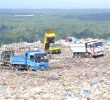“Barangays need to take over the work,” Cenro’s Solid Waste Management Board Divisions Chief Engr. Dolly Remojo said, pointing out the tendency of violators to obey only if Cenro enforcers are watching.
By IRENE V. DAGUDOG
Davao Today
DAVAO CITY, Philippines– The City Environment and Natural Resources Office (Cenro) urges village officials to help monitor garbage collection points in their jurisdiction to ensure that waste thrown by households and establishments at the garbage bins are segregated.
Cenro’s Solid Waste Management Board Divisions Chief Engr. Dolly Remojo admits it’s hard for them to convince the people to observe the waste segregation program even if it has been in place for almost four years now.
“Barangays need to take over the work,” Remojo said, pointing out the tendency of violators to obey only if Cenro enforcers are watching.
“Naa gyud tay mga kaigsoonan nga gusto lang gyud molabay sa ilang basura in a very easy way ug kami ra pod ang bantayan. Kung walay mga Cenro enforcers, modalikyat pud sila og labay nga sagol-sagol,” she said.
However, Remojo cited that there are still villages that tend to be lenient towards offenders. In such cases, some residents are suggesting that Cenro provides the manpower at the collection points in the villages to ensure strict observance of the law.
The City has implemented a mandatory waste segregation scheme under the Ecological Solid Waste Management Ordinance of 2009, obliging households and establishments to segregate garbage according to types of solid waste which are either, biodegradable, recyclable and residual.
Residents are encouraged to practice backyard composting for biodegradable wastes, or turn them over to the villages. Recyclable wastes may be sold to junk shops while residual and special wastes are required to be thrown to designated collection points only during throwing time which is at 6 to 9 PM.
Non-segregation of solid waste is a prohibited act. First offenders are fined PHP 300 and are required to undergo a mandatory seminar. A fine of PHP 500 is exacted if they violate the law for the second time and a five-day community service, while third offenders are fined PHP 1,000 and are required to render a 10-day community service.
Some residents however are saying that they find segregating solid waste in their households in vain as these still get lumped in the garbage truck, a thing that Cenro’s Engr. Remojo has denied.
“Dili baya gyud. Naa lang gyud toy higayon nga napugos na lag kuha ang garbage truck sa residual nga basura kay kung dili namo na kuhaon manimaho gyud ang syudad,” Remojo said.
Remojo explains that the City has 80 garbage truck units, with 24 to 25 of them passing by main highways every night, and more than 20 trucks every morning, picking up garbage from collection points in subdivisions. Davao City has 182 villages.
So far, according to Cenro, a total of 3,108 offenders were punished by paying fines and 64 were convicted for non-segregating violations, while a total of 617 were made to attend seminars.
Some residents interviewed by davaotoday.com meanwhile have cited that the fines system imposed on violators have worked on them.
“Ginasunod gyud namo kay dako pud baya ang multa,” Teresita Biro, a resident of Matina Gravahan said, adding that the recent flooding in the City has also reinforced their compliance with the law. “Makaayo man pud na sa atoa arun dili magbara ang basura sa kanal. Mao pud baya na ang cause sa pagbaha,” she said.
Data from an article posted in the Department of Environment and Natural Resources (DENR)-XI website cites that a total of 144,606, 491 pounds of marine debris were collected during the worldwide coastal clean-up in 2010. These were mostly composed of cigarette butts, cellophanes, plastic caps and plastic containers.
In the recent coastal clean-up in the region, cellophanes and other types of plastics also ranked among the highest marine debris collected, the data from the DENR further cited.
Cenro’s Remojo likewise encouraged Davaoeños who have enough space in their backyards to put to use bio-degradable waste such as into fertilizers, and also, collect recyclable materials, in such a way, they can still make money out of them.
The branch manager of a restaurant along Ponciano Street boasts that they are one of the establishments in the city practicing waste segregation.
“Sa segregation, lahi gyud tong plastic, tapos, naka-separate pud tong panit sa gulay. Meron din kaming container para sa mga tira-tirang pagkain, at sa backyard area, dun namin nilalagay ang mga bottles at karton, na pwedeng maibenta pa.”
The Cenro admits there is more to be done in terms of heightening the awareness of Davaoeños to ensure a high compliance on proper waste disposal and they are trying to do this by intensifying their information drive in the villages. (Irene V. Dagudog/davaotoday.com)









